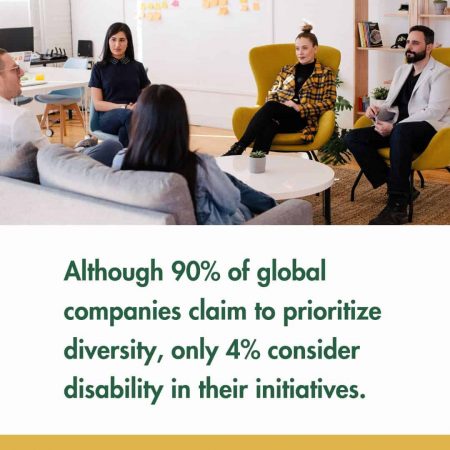Is Disability the Forgotten Diversity in the Workplace?
Disability is a form of diversity in the workplace. Although 90 per cent of global companies claim to prioritize diversity, only four per cent consider disability in their initiatives.
A Psychology Today article, “Disability at Work: The Forgotten Diversity,” mentions that the low numbers of persons who experience disability in the workplace may partly be due to their numbers being underestimated. While 25 percent of all employees self-identify as having a disability, most companies report that just four to seven per cent of their employees experience disability.
Most disabilities are not visible. For instance, mental health conditions are the most prevalent in the US.
Three workplace realities emerged from a 2023 report (Your Workforce Includes People with Disabilities. Does Your People Strategy?) by the Boston Consulting Group (BCG):
- Employees who experience disability are significantly under-disclosing due to fear of stigma or the impact on job security or promotion.
- Employers are missing an opportunity to enable a quarter of their workforce to bring their full selves to work.
- Employers’ decisions about investments in tailored support systems are founded on inaccurate data.
The BCG report shows that organizations can improve disability inclusion—and the workplace experience of all employees—by implementing:
- employee-centric policies and programs, such as flexible work,
- mentorship, which improves overall happiness at work, and
- workplace accommodations.

Workplace inclusion for all persons is crucial from a human perspective.
While the business case for diversity and inclusion is important, it should be balanced with the case for systemic justice for all, including persons experiencing disability.
Recent research from the Yale School of Management and the London Business School suggests that the business case for inclusion can be a turn-off for underrepresented job candidates. The need for a business case forces some groups to justify their existence to the more privileged or, in the case of persons experiencing disability, to prove their existence.
It’s worth noting that this research included LGBTQ+ professionals, female job seekers in STEM and African American students—and no persons experiencing disability.

